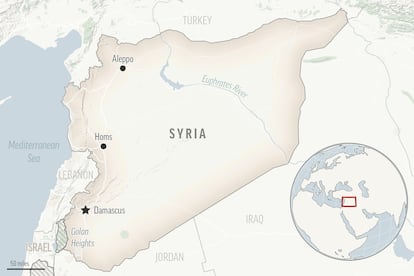US military says senior IS commander killed in Syria
A drone strike carried out by the American-led coalition has killed a senior member of the Islamic State group who was in charge of planning attacks in Europe

A drone strike carried out by the American-led coalition in northwestern Syria has killed a senior member of the Islamic State group who was in charge of planning attacks in Europe, the United States military said Tuesday.
The man killed Monday in the strike was identified by a U.S. military statement as Khalid Aydd Ahmad al-Jabouri. The military statement added that his death “will temporarily disrupt the organization’s ability to plot external attacks.”
Monday’s strike was the latest by the U.S. military to kill a top official with the extremist group that once controlled large parts of Iraq and Syria, where it declared a “caliphate.” From the areas they once controlled, the extremists planned deadly attacks in Europe that killed scores of people. In recent years, such attacks have decreased because the Islamic State group lost the last sliver of land it controlled in March 2019.
The extremist sleeper cells are still launching deadly attacks in Syria and Iraq.
Opposition activists in northwest Syria said the man killed showed up in the area about 10 days ago, claiming to be a displaced person from the eastern province of Deir el-Zour, bordering Iraq. Al-Jabouri is one of Iraq’s biggest tribes that also has presence in east and north Syria and the man might have said that he is from Deir el-Zour to hide his Iraqi identity as residents of east Syria speak Arabic dialect similar to the one spoken in Iraq.
The Britain-based Syrian Observatory for Human Rights, an opposition war monitor, said on Monday that one person was killed in a drone strike near the rebel-held village of Kefteen. The Observatory’s chief Rami Abdurrahman identified the dead man as an Iraqi citizen who was struck with a missile as he spoke on his cellular phone outside the home he rented.
The opposition’s Syrian Civil Defense, also known as the White Helmets, said it evacuated the man from the scene of the attack and he later succumbed to his wounds.
The strike was the latest in a series of attacks over the past years targeting al-Qaida-linked militants and senior members of the Islamic State group in northwestern Syria.
Most of those killed by U.S. strikes in the rebel-held Idlib province over the past years were members of al-Qaida offshoot Horas al-Din, which is Arabic for “Guardians of Religion.” The group includes hardcore al-Qaida members who broke away from Hayat Tahrir al-Sham, the strongest insurgent group in Idlib province.
In February, a drone strike killed two men, whom local activists initially identified as Horas al-Din members. The Observatory later said that one of the two killed was a senior member of the Islamic State group that was defeated in Syria in March 2019.
The founder of the Islamic State group, Abu Bakr al-Baghdadi, was hunted down by the Americans in a raid in Idlib in October 2019. His successor, Abu Ibrahim al-Hashimi al-Qurayshi, was also killed in a U.S. raid in February 2022 in northwest Syria.
In October, Syrian rebels killed the group’s leader, Abu al-Hassan al-Hashimi al-Qurayshi, and he has since been replaced by Abu al-Hussein al-Husseini al-Qurayshi.
None of the al-Qurayshis are believed to be related. Al-Qurayshi is not their real name but comes from Quraish, the name of the tribe to which Islam’s Prophet Muhammad belonged. IS claims its leaders hail from this tribe, and “al-Qurayshi” serves as part of an IS leader’s nom de guerre.
Sign up for our weekly newsletter to get more English-language news coverage from EL PAÍS USA Edition
Tu suscripción se está usando en otro dispositivo
¿Quieres añadir otro usuario a tu suscripción?
Si continúas leyendo en este dispositivo, no se podrá leer en el otro.
FlechaTu suscripción se está usando en otro dispositivo y solo puedes acceder a EL PAÍS desde un dispositivo a la vez.
Si quieres compartir tu cuenta, cambia tu suscripción a la modalidad Premium, así podrás añadir otro usuario. Cada uno accederá con su propia cuenta de email, lo que os permitirá personalizar vuestra experiencia en EL PAÍS.
¿Tienes una suscripción de empresa? Accede aquí para contratar más cuentas.
En el caso de no saber quién está usando tu cuenta, te recomendamos cambiar tu contraseña aquí.
Si decides continuar compartiendo tu cuenta, este mensaje se mostrará en tu dispositivo y en el de la otra persona que está usando tu cuenta de forma indefinida, afectando a tu experiencia de lectura. Puedes consultar aquí los términos y condiciones de la suscripción digital.








































